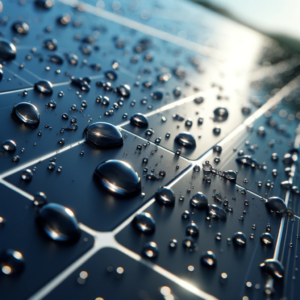Nano Coating for Solar Panels: Enhancing Efficiency and Longevity
Solar panels have become an integral part of the renewable energy landscape, harnessing the power of the sun to generate electricity. However, these panels are exposed to various environmental factors that can impact their efficiency and lifespan. To address these challenges and improve the performance of solar panels, nano coating technology has emerged as a game-changing solution. In this article, we will explore what nano coating is, how it works, the benefits it offers for solar panels, and why it’s crucial for the future of clean energy.
The Science Behind Nano Coating
Nano coating, also known as nanocoating or nanotechnology coating, involves applying a liquid polymer containing nanoparticles to the surface of solar panels. These nanoparticles are typically composed of materials like silica or titanium dioxide. When applied, they create an ultra-thin and transparent protective layer that bonds at the nanoscale level.
What sets nano coating apart is its superhydrophobic and oleophobic properties. Superhydrophobic materials repel water, while oleophobic materials repel oil-based substances. For solar panels, this means that nano coatings create a water-repellent and dirt-repellent surface, preventing the accumulation of dust, dirt, and moisture.
The Benefits of Nano Coating for Solar Panels
 Nano coating for solar panels offers a wide range of benefits that enhance their efficiency and lifespan:
Nano coating for solar panels offers a wide range of benefits that enhance their efficiency and lifespan:
- Increased Efficiency: Nano coatings reduce the accumulation of dirt and dust on solar panels, allowing more sunlight to reach the photovoltaic cells and improving energy conversion.
- Self-Cleaning: Coated panels are self-cleaning to some extent, as rainwater easily washes away dirt and debris, reducing the need for manual cleaning.
- Extended Lifespan: Nano coatings protect solar panels from environmental factors such as UV radiation, humidity, and pollutants, prolonging their lifespan.
- Reduced Maintenance: With fewer contaminants adhering to the surface, coated panels require less frequent cleaning and maintenance.
- Environmental Impact: Improved solar panel efficiency reduces the need for additional panels and lessens the environmental footprint of solar energy production.
Applications of Nano Coating for Solar Panels
Nano coating is suitable for various types of solar panels, including but not limited to:
- Photovoltaic (PV) Panels: Nano coatings enhance the efficiency of traditional PV panels used in residential and commercial installations.
- Thin-Film Solar Panels: Thin-film solar panels can benefit from nano coatings to protect their sensitive surface materials and improve performance.
- Solar Farms: Large-scale solar farms can use nano coatings to optimize the energy output of their panels and reduce maintenance costs.
- Off-Grid Solar Systems: Off-grid solar systems in remote locations can benefit from improved efficiency and reduced maintenance requirements.
Caring for Nano-Coated Solar Panels
To ensure the longevity and continued effectiveness of nano coatings on solar panels, follow these care and maintenance guidelines:
- Periodic Inspection: Regularly inspect the panels for damage or signs of wear, and address any issues promptly.
- Rainwater Rinse: Let natural rainfall help with cleaning, as the superhydrophobic properties of the coating encourage self-cleaning.
- Professional Cleaning: If necessary, engage professionals for periodic cleaning using non-abrasive materials and detergents that won’t damage the coating.
In conclusion, nano coating for solar panels is a groundbreaking technology that enhances the efficiency and longevity of solar energy systems. As the world continues to transition towards clean and sustainable energy sources, maximizing the performance of solar panels is essential. Nano coatings offer a practical solution to reduce maintenance efforts, improve energy production, and contribute to a greener future.
Have any questions or share your expertise for Solar Panel Coatings
Join the conversation!



Plaats een Reactie
Meepraten?Draag gerust bij!